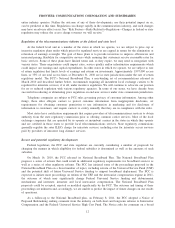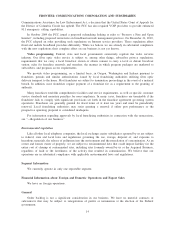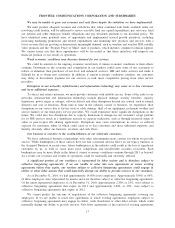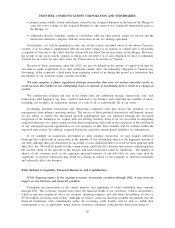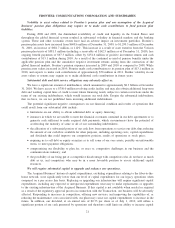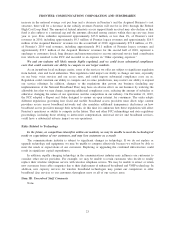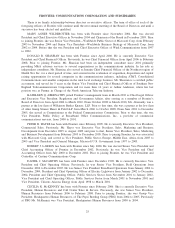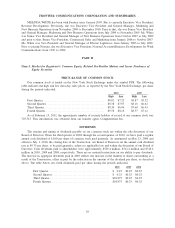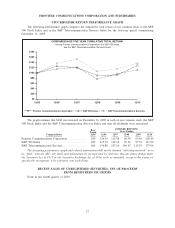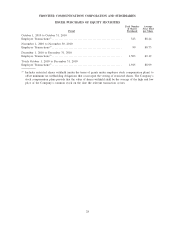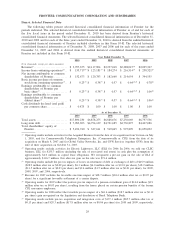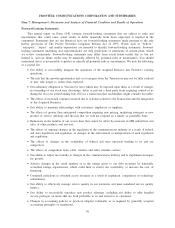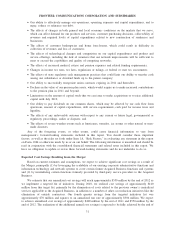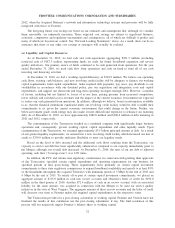Frontier Communications 2010 Annual Report Download - page 23
Download and view the complete annual report
Please find page 23 of the 2010 Frontier Communications annual report below. You can navigate through the pages in the report by either clicking on the pages listed below, or by using the keyword search tool below to find specific information within the annual report.expenditures significantly. While we believe that our anticipated cash flows will be adequate to maintain this
dividend policy while allowing for appropriate capital spending and other purposes, any material reduction in
cash generated by operations and any increases in planned capital expenditures, interest expense or cash taxes
would reduce the amount of cash available for further capital expenditures and payment of dividends.
Accelerated losses of access lines, the effects of increased competition, lower subsidy and access revenues and
the other factors described above may reduce our cash generated by operations and may require us to increase
capital expenditures.
Risks Related to Regulation
Changes in federal or state regulations may reduce the switched access charge revenues we receive.
A significant portion of Frontier’s total revenues (approximately $285.5 million, or 8%, in 2010 and
$246.3 million, or 12%, in 2009), including a significant portion of Frontier legacy revenues (approximately
$213.9 million, or 10%, in 2010) and a significant portion of the Acquired Business’ revenues (approximately
$71.7 million, or 4%, for the second half of 2010) are derived from switched access charges paid by other
carriers for services Frontier legacy operations or the Acquired Business, as the case may be, provides (or
provided) in originating and terminating intrastate and interstate long distance traffic. As a result, Frontier
expects a significant portion of the Company’s revenues will continue to be derived from access charges paid
by these carriers for services that the Company will provide in originating and terminating this traffic. The
amount of switched access charge revenues that the Company will receive for these services is regulated by the
Federal Communications Commission (the FCC) and state regulatory agencies.
The FCC is considering proposals that may significantly change interstate, intrastate and local intercarrier
compensation. On March 16, 2010, an FCC staff team issued its National Broadband Plan that recommends
changes to the existing rate structure used for intercarrier charges. On February 8, 2011, the FCC issued a
Notice of Proposed Rulemaking on Intercarrier Compensation and Universal Service reforms. The FCC also
has an ongoing proceeding considering whether to make changes to its regulatory regime governing special
access services. When and how these proposed changes will be addressed is unknown and, accordingly,
Frontier cannot predict the impact of future changes on the Company’s results of operations.
Certain states also have open proceedings to address reform to access charges and other intercarrier
compensation. In addition, Frontier has been approached by, and is currently involved in formal state
proceedings with, various carriers seeking reductions in intrastate access rates in certain states. Certain of those
claims have led to formal complaints to the applicable state regulatory agencies. Frontier cannot predict when
or how these matters will be decided or the effect on the Company’s subsidy or access revenues. However,
future reductions in the Company’s access revenues will directly affect the Company’s profitability and cash
flows as those regulatory revenues do not have the same level of associated variable expenses.
We are reliant on support funds provided under federal and state laws.
A significant portion of Frontier’s total revenues (approximately $212.3 million in the aggregate, or 6%, in
2010 and $113.3 million in the aggregate, or 5%, in 2009), including a significant portion of Frontier legacy
revenues (approximately $114.0 million, or 6%, in 2010) and a significant portion of the Acquired Business’
revenues (approximately $98.3 million, or 6%, for the second half of 2010) are derived from federal and state
subsidies for rural and high cost support, commonly referred to as universal service fund subsidies. The FCC
and state regulatory agencies are currently considering a number of proposals for changing the manner in which
eligibility for federal and state subsidies are determined as well as the amounts of such subsidies. The National
Broadband Plan recommends changes to the existing federal high cost subsidy programs. On February 8, 2011,
the FCC issued a Notice of Proposed Rulemaking on Universal Service and Intercarrier Compensation reforms.
Frontier cannot predict whether or when the FCC will take additional actions or the effect of any such actions
on the Company’s subsidy revenues.
Federal subsidies representing interstate access support, high cost loop support and local switching support
represented approximately $112.7 million, or 3%, of Frontier’s total revenues in 2010, including approximately
$63.6 million, or 3%, in 2010 of Frontier legacy revenues and approximately $49.1 million, or 3%, of the
Acquired Business’ revenues for the second half of 2010. Frontier currently expects that as a result of both an
22
FRONTIER COMMUNICATIONS CORPORATION AND SUBSIDIARIES


